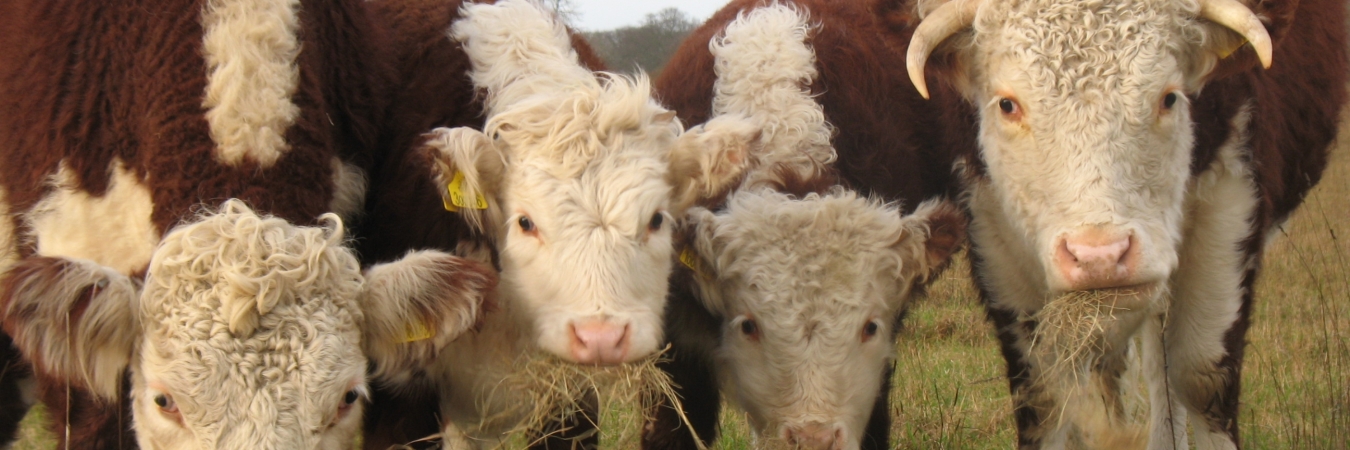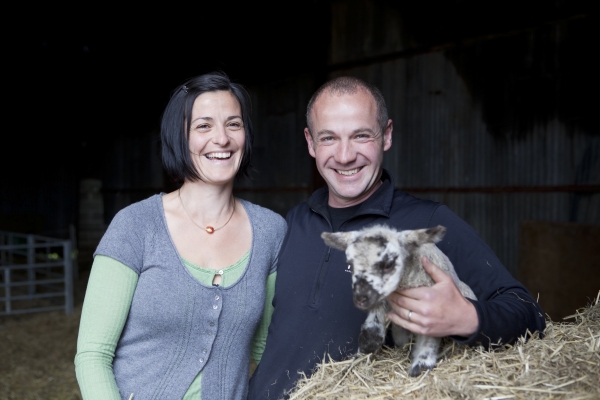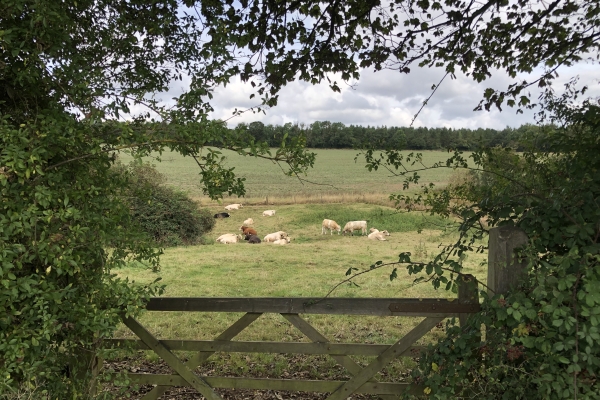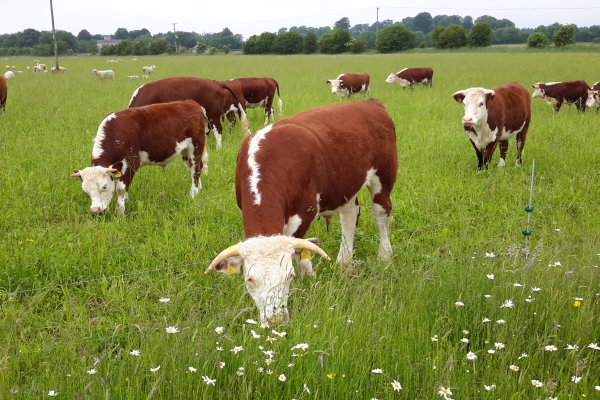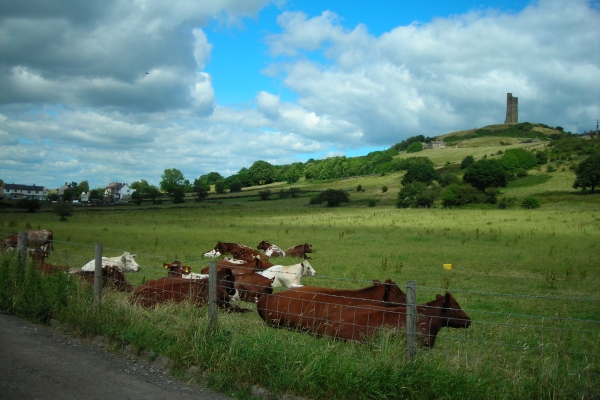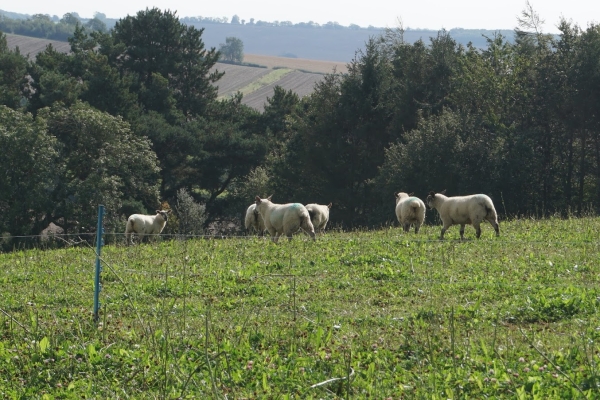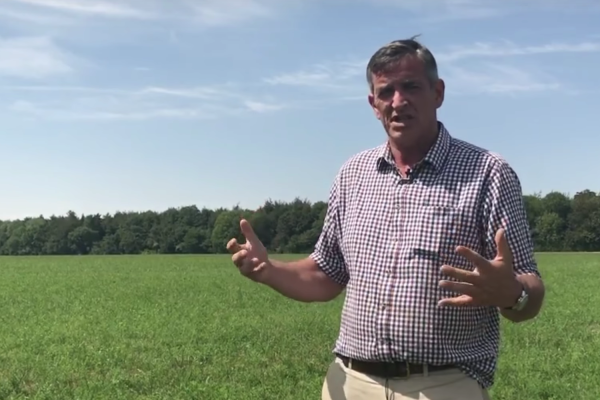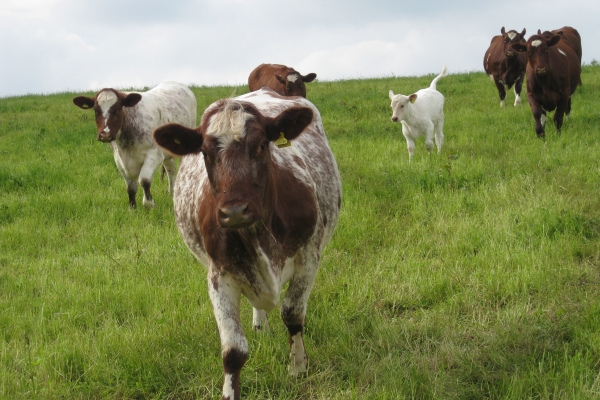Turning sunshine into Sunday dinner: Musings from a ‘pasture fed’ Cotswold farmer
Spring is in the air…
Spring is always an exciting time here at Conygree Farm. As the days lengthen and the skylarks rise and sing over the farm’s wildflower meadows, herb rich leys and wild bird cover, we will be lambing our pedigree Cotswold sheep, tending Old Spot piglets and watching over our small herd of rare Traditional Hereford suckler cows.
Conygree is something a little special. When you arrive you first notice the sweet smell of the wild flowers and herbs, and then you hear the chatter of 1000 finches. When the sun shines the air is full of butterflies, bees and other insects.
Forming part of the National Trusts’ Sherborne Park Estate near Northleach, in the heart of the Cotswolds, the farm is 75 hectares of organic grass and brashy arable land. It is also the foreground to the Trusts’ historic Lodge Park.
We, that’s me, Jonty Brunyee, and my wife Mel, are passionate about farming and the natural environment believing that for the two to thrive, they must go hand in hand. Rare breeds, local food, resource conservation (air, soil, water and carbon) and educational visits are also part of the mix. Our main food product is premium ‘pasture fed’ meat; beef, lamb, hogget (lamb at one year old), mutton, and a little pork. We keep things simple. We turn sunshine into Sunday dinner. Nothing added. Everything is sold locally from the farm door and website. We do not push for the highest yields or fastest growing lambs or steers; we want our farm to be a landscape rich in heritage, flora and fauna, and grazed extensively by naturally maturing native breeds.
Our rare Cotswold sheep, otherwise known as the Cotswold Lion, are famed for their long golden fleece but they also make very tasty lamb, hogget and mutton. Our cattle are from the original population Hereford bloodlines and have never been crossed with other larger breeds. They can live outdoors all year and fatten gently on our species-rich grasslands, producing beef full of flavour, omega 3 fatty acids and fine marbling.
Our system is based on agro-ecological principles; moving from good old fashioned farm conservation, to land use sustainability, to regenerative holistic systems where we aim to put more back in than we take out. This means, for example, building organic matter, increasing biodiversity and adding to the local food economy.
Pasture for Life
Imagine a farming system that provides nutritious food from high welfare ruminants, positive economic returns for farming families and environmental regeneration…Too good to be true? I think it is possible, and it is what we are trying to develop here at Conygree.
I believe that beef, sheep and dairy systems based on a natural diet of 100% pasture (grasses, herbs and legumes) offers a sustainable solution to many of the problems associated with the livestock industry today.
There are numerous benefits of dropping the inefficient and damaging grain habit. To boot, well managed grass/pasture based systems can rebuild soils, soak up rainwater, provide pollinator and farmland bird habitat, improve animal welfare and rear livestock that produce great tasting meat and milk with enhanced nutritional profiles. Who needs soya from South America or maize grown on fragile soils here?
We are so passionate at Conygree about pasture fed production that our farm is assured by the Pasture-Fed Livestock Association (PFLA), selling our produce under the Pasture for Life marque. I am also one of the PFLA Directors, helping this wonderful farmer-led organisation grow.
Moving to an all grass system does not necessarily mean reduced stocking rates or reduced profits; evidence I helped collate for the PFLA It Can Be Done booklet suggests the opposite. High output and reduced costs are possible, and exciting opportunities exist for branding and added value sales. It’s a no grainer! It’s a win-win-win!
Lots of Pasture for Life farmers are, like us, organic and we all champion good farming practice based on ecological principles (aka Agricology). Are you a member yet?
Find out more about Conygree Farm here:
- Web: www.conygreefarm.co.uk
- Email: info@conygreefarm.co.uk
- Phone: Jonty Brunyee 07786 305508
To learn more about the Pasture for Life ethos see:
- Web: www.pastureforlife.org
- Email: execsec@pfla.org.uk
- Phone: Russ Carrington 07930 378413
